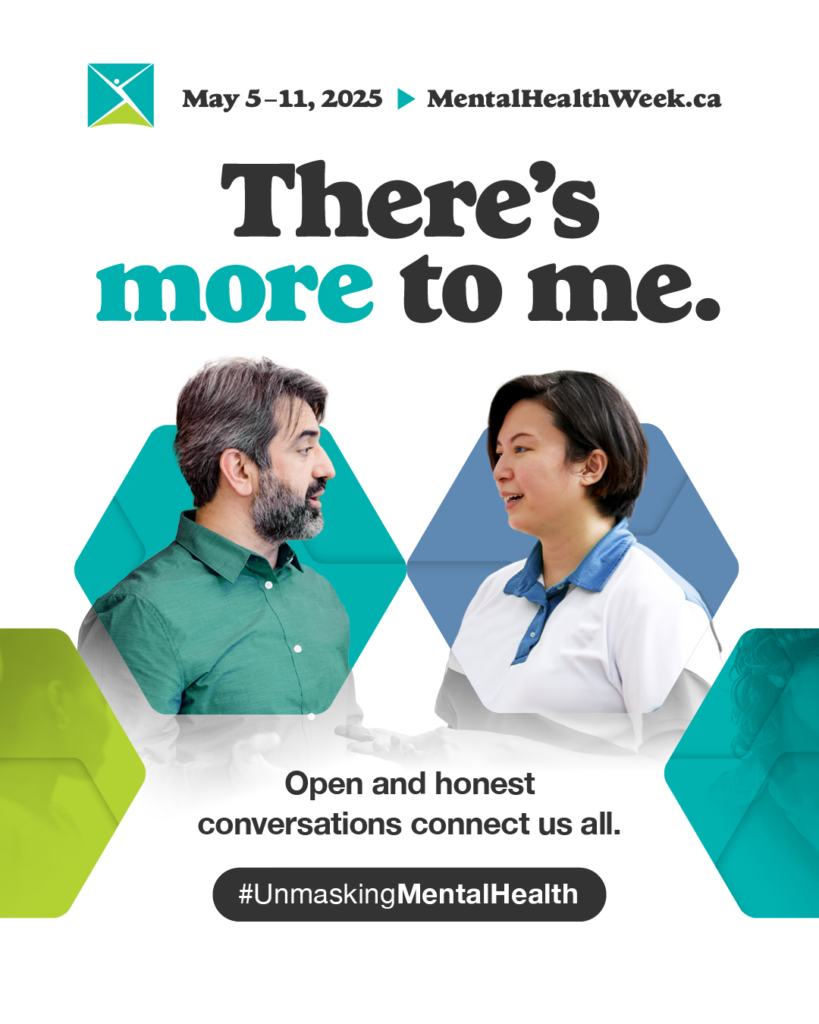Menu Close

Mental Health Week – May 5th – May 10th
May 6, 2025
WHAT DOES MASKING LOOK LIKE?
People who regularly mask do it well, so it’s not always easy to tell when it’s happening.
People pleasing is such a common masking behaviour for women and girls that it often goes
unnoticed, not only by others but also by themselves. Likewise, for boys and men, toughness is
a common, often unconscious masking behaviour. When we pay close attention to our own and
others’ actions, words, moods, and physical responses, we can sometimes see those masks
and seeing them is part of how we let them go.
What we might notice in ourselves when we mask:
• Experiencing headaches or fatigue, especially after socializing
• Overthinking or having repetitive thoughts about a situation
• Avoiding social interactions
• Faking laughter
• Spending more time or effort than others to “keep up”
• Looking to others before answering, reacting, or making a decision
• Constant self-monitoring and/or feelings of fear of doing or saying the wrong thing
• Needing a lot of time to recharge after social interactions
• Feelings of “Not enough”
What we might notice in others who mask:
• Seeming emotionless
• Withdrawing socially
• Saying “I’m fine” even when it’s clear they’re struggling
• Using self-deprecating humour
• Looking to others before answering, reacting, or making a decision
• Behaving inconsistently
• Mimicking behaviours
There’s more to me. There’s more to a person than meets the eye and we should all be free to be our true selves. When we’re able to be ourselves, to shed our masks, we create deeper connections which strengthen our sense of belonging, improve self-esteem, and support good mental health. But unmasking isn’t just a switch we can flip; it’s a gradual process of unlearning established behaviours and it requires people to feel safe and accepted. For the individual, unmasking takes courage, patience, and trust, but masking isn’t just an individual problem — it’s a social one. Creating a world in which people feel safe enough to share more parts of themselves with others will require changes to the policies, systems and
attitudes that make people feel the need to mask in the first place.
Help others unmask:
• Fight stigma: have open conversations about mental health and substance use to help normalize different experiences and situations.
• Lead by example: open up and be vulnerable around others to show them it’s ok.
• Ask twice: when someone says, “I’m fine” and you suspect they aren’t, take a moment to ask again, showing genuine care and interest.
• Give people permission to share real feelings: some environments, like workplaces, have traditionally expected people to leave their feelings, experiences, and struggles at the door but this can lead to bottled up emotions or fatigue that negatively affect performance and cause burnout.
• Provide peer support: create opportunities for people to share whether it’s a formal peer support program or just letting people know what you can support them with.
• Learn about systemic oppression (colonialism, racism, sexism, socioeconomic inequality, ableism) and listen to others’ concerns and experiences with an open mind.
• Speak up when you see someone say or do something that’s harmful or discriminatory. Unmasking ourselves
• Learn more about when and why you mask: figure out which people or situations cause you to put on a mask and, conversely, identify situations and people you don’t mask for.
• Experiment in low-risk situations: start unmasking with people and in situations you feel safe doing so. Feel things out by sharing small things and reflect on how you feel.
• Set boundaries: decide who you will open up to and what you’re okay sharing or talking about and, if you’re comfortable, communicate your needs to others.
• Self-care: spend more time with people and in places you feel safe/comfortable to be yourself, take breaks when you have to be in places where masking feels necessary, balance your social and alone time, and find ways to release and recharge after draining situations.
• Seek peer support: connecting with others who share similar experiences provides space for validation and comfort and can provide extra support as you explore unmasking.
Open and honest conversations connect us all. When and how a person chooses to unmask
is personal, and unmasking might not always be safe. The more we all work together to
fight stigma, challenge the idea of normal, and foster open conversations, the easier it gets for
people to be who they are without fear.
